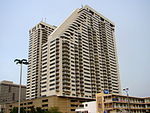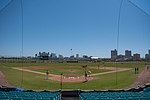World War I Memorial (Atlantic City, New Jersey)
1922 establishments in New Jersey1922 sculpturesBronze sculptures in New JerseyBuildings and structures in Atlantic City, New JerseyDeath in art ... and 11 more
Greek Revival architecture in New JerseyLiberty symbolsMonuments and memorials on the National Register of Historic Places in New JerseyNational Register of Historic Places in Atlantic County, New JerseyNew Jersey Register of Historic PlacesNew Jersey Registered Historic Place stubsSculptures of women in New JerseyStatues in New JerseyTourist attractions in Atlantic County, New JerseyUse mdy dates from August 2023World War I memorials in the United States

The World War I Memorial is located in Atlantic City, Atlantic County, New Jersey, United States. The memorial was built in 1922, and added to the National Register of Historic Places on August 28, 1981.The rotunda houses a 9-foot (2.7 m) bronze statue titled Liberty in Distress by Frederick W. MacMonnies. Inside the rotunda there are four medallions (Army, Navy, Marines, and Aviation) that alternate around the circumference of the frieze. The names of battles in which Atlantic City soldiers fought are inscribed upon the architrave.
Excerpt from the Wikipedia article World War I Memorial (Atlantic City, New Jersey) (License: CC BY-SA 3.0, Authors, Images).World War I Memorial (Atlantic City, New Jersey)
Ventnor Avenue, Atlantic City
Geographical coordinates (GPS) Address Nearby Places Show on map
Geographical coordinates (GPS)
| Latitude | Longitude |
|---|---|
| N 39.351388888889 ° | E -74.455277777778 ° |
Address
Ventnor Avenue
Ventnor Avenue
08401 Atlantic City
New Jersey, United States
Open on Google Maps





